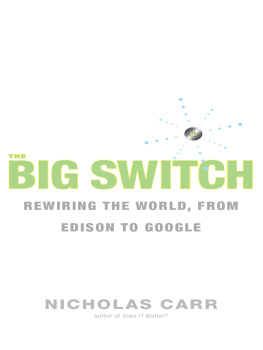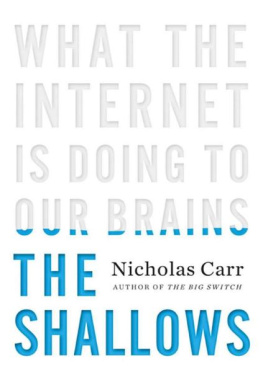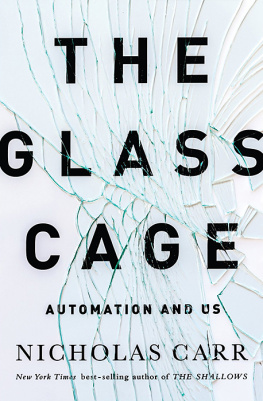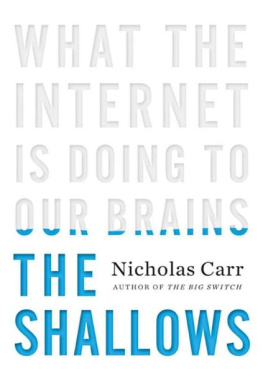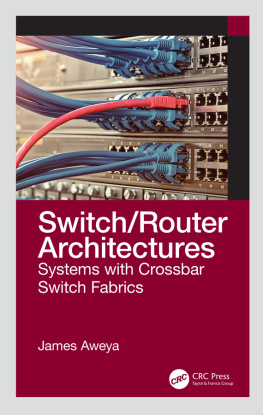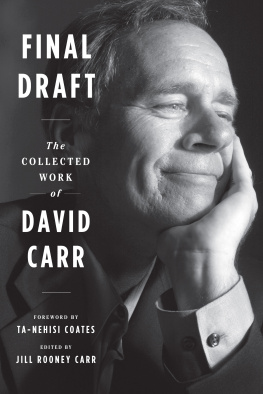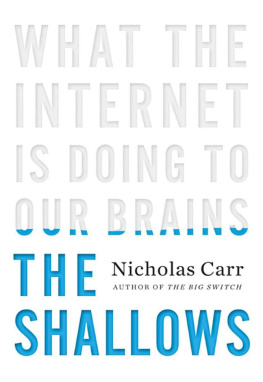Nicholas Carr - The Big Switch
Here you can read online Nicholas Carr - The Big Switch full text of the book (entire story) in english for free. Download pdf and epub, get meaning, cover and reviews about this ebook. year: 2008, publisher: W. W. Norton & Company, genre: Romance novel. Description of the work, (preface) as well as reviews are available. Best literature library LitArk.com created for fans of good reading and offers a wide selection of genres:
Romance novel
Science fiction
Adventure
Detective
Science
History
Home and family
Prose
Art
Politics
Computer
Non-fiction
Religion
Business
Children
Humor
Choose a favorite category and find really read worthwhile books. Enjoy immersion in the world of imagination, feel the emotions of the characters or learn something new for yourself, make an fascinating discovery.
- Book:The Big Switch
- Author:
- Publisher:W. W. Norton & Company
- Genre:
- Year:2008
- Rating:5 / 5
- Favourites:Add to favourites
- Your mark:
- 100
- 1
- 2
- 3
- 4
- 5
The Big Switch: summary, description and annotation
We offer to read an annotation, description, summary or preface (depends on what the author of the book "The Big Switch" wrote himself). If you haven't found the necessary information about the book — write in the comments, we will try to find it.
The Big Switch — read online for free the complete book (whole text) full work
Below is the text of the book, divided by pages. System saving the place of the last page read, allows you to conveniently read the book "The Big Switch" online for free, without having to search again every time where you left off. Put a bookmark, and you can go to the page where you finished reading at any time.
Font size:
Interval:
Bookmark:
Does IT Matter?
Rewiring the World, From Edison to Google
Nicholas Carr
W. W. N ORTON & C OMPANY
New York London
Excerpt from All Watched Over by Machines of Loving Grace from The Pill Versus the Springhill Mine Disaster by Richard Brautigan. Copyright 1968 by Richard Brautigan. Reprinted by permission of Houghton Mifflin Company.
All rights reserved.
Copyright 2008 by Nicholas Carr
All rights reserved
First Edition
For information about permission to reproduce selections from this book, write to Permissions, W. W. Norton & Company, Inc., 500 Fifth Avenue, New York, NY 10110
Production manager: Anna Oler
Library of Congress Cataloging-in-Publication Data
Carr, Nicholas G., 1959
The big switch: rewiring the world, from Edison to Google/Nicholas
Carr.1st ed.
p. cm.
Includes bibliographical references and index.
ISBN: 978-0-393-06786-6
1. Computers and civilization. 2. Information technologySocial aspects. 3. Technological innovations. 4. Internet. I. Title.
QA76.9.C66C38 2008
303.48'34dc22
2007038084
W. W. Norton & Company, Inc.
500 Fifth Avenue, New York, N.Y. 10110
www.wwnorton.com
W. W. Norton & Company Ltd.
Castle House, 75/76 Wells Street, London W1T 3QT
One lingered long among the dynamos, for they were new, and they gave to history a new phase.
Henry Adams
A Doorway in Boston
I T WAS A blustery November day, cold but bright, and I was lost. The directions Id printed off the Internet werent doing me any good. The road map that had looked so simple on my computer screen had turned into a ball of real-world confusionthanks to Bostons cow-path roads and its plague of twisted street signs. As the digits of my dashboard clock clicked past the scheduled time for my lunch meeting, I decided Id have better luck on foot. I pulled into an open parking space across from the high green walls of Fenway Park, got out of the car, and asked a passerby for directions. He pointed me to a nearby street and, at last able to follow the twists and turns of my MapQuest printout, I soon arrived at the right place: a hulking gray building at the end of a litter-strewn side street.
At least I thought it was the right place. I was looking for a company named VeriCenter, but there was no name on the buildingjust a beat-up little sign with a street number hanging from a post above a heavy steel door. I double-checked the address: it was definitely the right number. So I pushed the door open and walked into the worlds most unwelcoming entryway: no furniture, no window, no company directory, no nothing. Just a black phone without a keypad on the wall beside another heavy steel door.
I lifted the phone and a mans voice came on the line. I gave him my name and the name of the person Id come to meet, and he buzzed me throughinto a second entryway, nearly as barren as the first. The man, a security guard, sat behind a metal desk. He put my drivers license through a tiny scanner, printed a blurry image of my face onto a visitors pass, then had me sit in a chair beside an elevator. Someone would be down in a minute, he said. By this time, I was starting to wish I had stuck to my guns and turned down the meeting. A guy from VeriCenters PR firm had been sending me emails for some time, and Id been diligently forwarding them into the electronic trash bin. But when he managed to get hold of me by phone, I gave in and agreed to a meeting. Here I was, then perched on an uncomfortable chair in what appeared to be a dilapidated factory on the Friday before Thanksgiving in 2004.
To be honest, I found it pretty odd that the VeriCenter folks had been so intent on meeting me in the first place. I didnt know much about the companyit had been founded toward the end of the great dotcom boom, the publicist had told me, and it was headquartered in Houstonbut I did know that it was in the information technology business, and most people in the IT field kept their distance from me. I was the IT Doesnt Matter guy. That was the title of an article Id written a year and a half earlierin May 2003for the Harvard Business Review . I had argued that despite the many grand claims made about the power of corporate computer systems, they werent actually all that important to a companys success. They were necessaryyou couldnt operate without thembut most systems had become so commonplace that they no longer provided one company with an edge over its competitors. Whenever somebody did something new with a computer, everyone else soon followed suit. Strategically speaking, information technology had become inert. It was just another cost of doing business.
One reporter called the article the rhetorical equivalent of a 50-megaton smart bomb. For months afterward, the high and the mighty of the technology world went out of their way to attack my heretical idea. Steve Ballmer, Microsofts chief executive, declared it hogwash. Carly Fiorina, then the head of HewlettPackard, said I was dead wrong. Speaking at a big tech conference, Intels CEO, Craig Barrett, boomed at the audience, IT matters a whole lot! The controversy even found its way into the popular press. Newsweek dubbed me the technology worlds Public Enemy No. 1. When the Harvard Business School Press published an expanded version of the article as a book, the industry went through a whole new round of hysterics.
So, as you might imagine, I wasnt exactly used to being invited to lunch by computer companies.
T HE ELEVATOR OPENED and out stepped Jennifer Lozier, VeriCenters smartly dressed marketing director. She escorted me up to a conference room and introduced me to a handful of her colleagues, including one of VeriCenters founders, Mike Sullivan. A born entrepreneur, Sullivan could hardly contain his enthusiasm. He was holding a copy of my book, a couple of dozen Post-It notes sprouting from its pages. When I read this, he said, I knew I had to meet you. Were doing exactly what you write about. He tapped the cover of the book. This is our business.
I was puzzled. Why would an IT company embrace the idea that IT doesnt matter?
Sullivan explained that he used to work as a general manager for Microsoft but that in 1999 he left to help launch VeriCenter because he wanted to pioneer a whole new way of supplying information technology to companies. He was convinced that, instead of buying and running their own computers and software, businesses in the future would just plug into the Internet and get all the data processing they needed, served up by outside utilities for a simple monthly fee. In my book, Id compared information technology to electricity. VeriCenter, said Sullivan, was taking the next logical step: to actually supply it like electricity, through a socket in the wall.
After a quick lunch and the obligatory PowerPoint presentation about the company, Sullivan said he wanted to give me a tour of the data center. He led me back downstairs, through a hallway, to yet another doorthis one constructed of steel mesh. The security guard diligently checked our badges before unlocking the door with a keycard chained to his belt. He escorted us inside.
Passing through that door was like entering a new world. The building may have looked like an old factory from the outside, but hidden inside was something altogether differentsomething not from the industrial past but the digital future. Stretching out before me, illuminated by the steady, sterile light of a thousand fluorescent bulbs, was a room the size of a city block, and it was filled with big computers. They stood in long rows inside locked cages, bearing the familiar logos of companies like IBM, Sun Microsystems, Dell, and HP. There didnt seem to be any other people in the room, just the machines, their fans humming and their red and green LEDs pulsing placidly as billions of bits of data streamed through their microprocessors. Overhead, big vents sucked up the heat from all the chips while other vents pumped in cool, filtered air.
Font size:
Interval:
Bookmark:
Similar books «The Big Switch»
Look at similar books to The Big Switch. We have selected literature similar in name and meaning in the hope of providing readers with more options to find new, interesting, not yet read works.
Discussion, reviews of the book The Big Switch and just readers' own opinions. Leave your comments, write what you think about the work, its meaning or the main characters. Specify what exactly you liked and what you didn't like, and why you think so.

